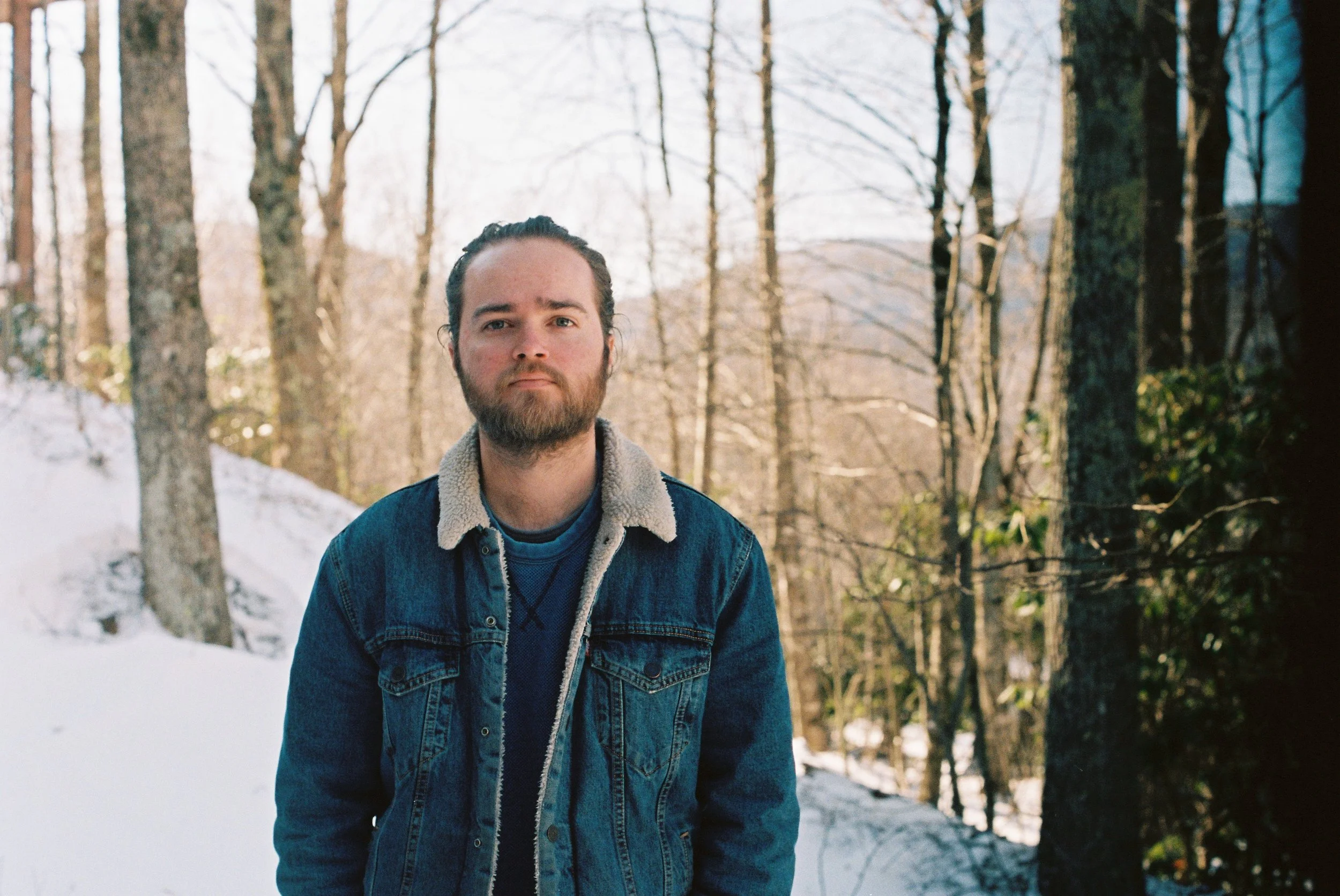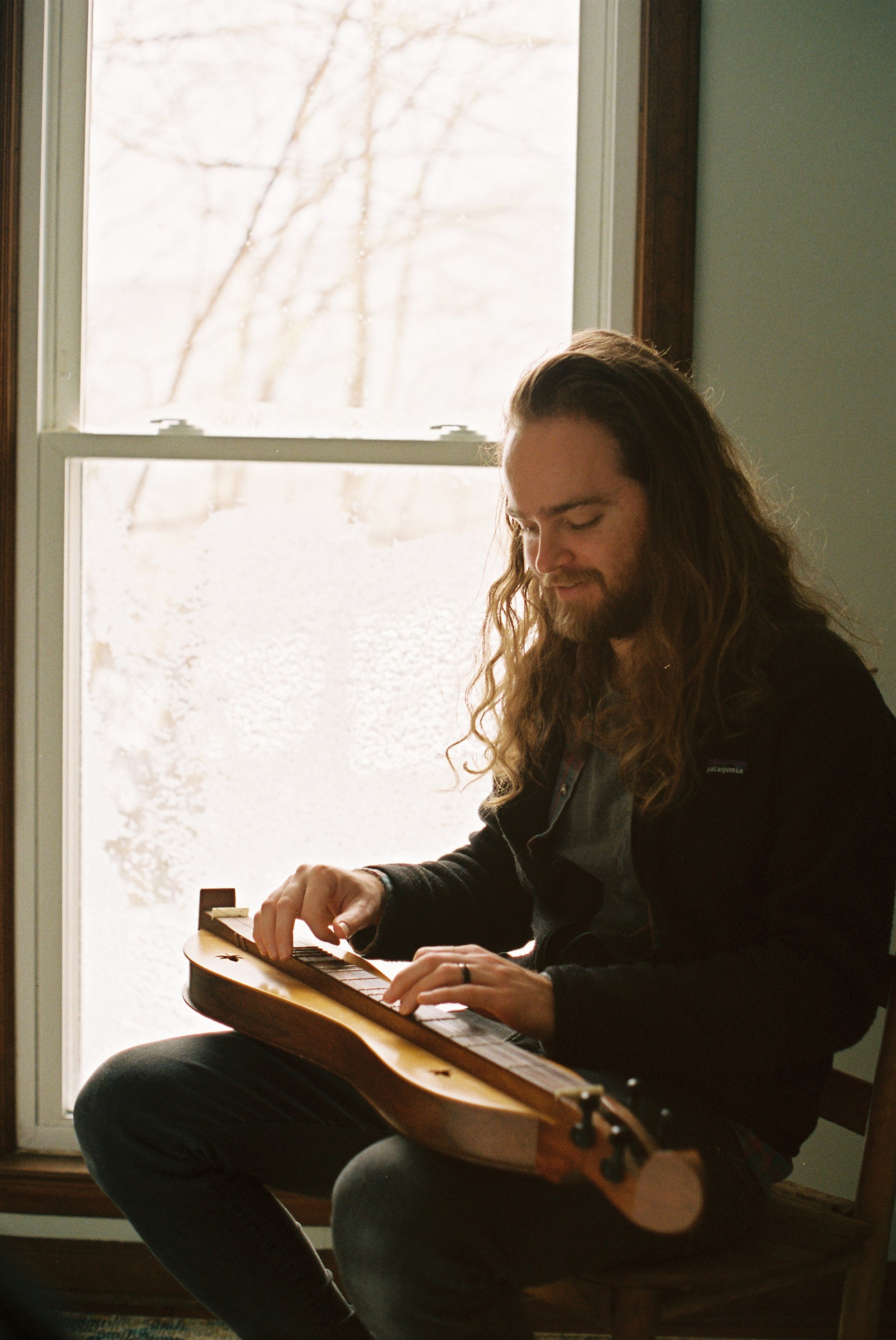All in All

All in All
An Interview with John Lucas by Michael Wilcher
The song begins with a chorus of crickets and frogs out somewhere behind the curtains of a humid night. It’s the sound that tells the South that it’s about time to head off to sleep, and it brings to mind a whole host of flashing memories that we who live here can recall as easily as our own name. We see the little white moths throwing their bodies against the porchlight, flickering the red-gold glow across our faces beside solid shadows. It is still somehow hot at night here, and you are alone in a rocking chair that has not moved from its place in decades, staring into the dark cathedral of trees where the chorus sings.
And then the piano begins a slow, quarter-note rhythm in a major key and yet somehow suffering. You can hear the sustaining pedal groan slightly as it lowers and releases. And then he sings in something close to a whisper, “Oh I’ve known too many men who’ve been hung with the Bible Belt”. This is John Lucas’ voice, streaming forth in an almost-whisper, singing about home—and mine also—and the difficulties of faith in a place on earth.
*
Born in Charlotte, North Carolina, John Lucas Kovasckitz took guitar lessons early on but he says he really learned how to play piano from a TV program.“I saw this show on PBS or something where this guy was teaching piano for beginners, and he just had you make a claw. He moved the claw up and down the keys for a C and an F and an A-min and a G, and I thought, ‘Heck, I can make a claw.’” These were the real glory days—when music came home to him. From there on out, it was always about writing songs. A few chords and a melody is all it takes to get started, and accompanying them is a line or two that won’t leave his head.
Photography by Kovasckitz Brothers
Lucas’ creative career took a major step forward about ten years ago when he moved to Boone, North Carolina, to study Sustainable Development at Appalachian State. The city of Boone is nestled in the sweeping Appalachian mountains with their rippling, crackling green forests enshrouded in azure mists. Time, like the mountains themselves, rises and falls in a smooth, slow, breathing rhythm. It was amidst this soaring landscape that John Lucas met his wife, Danielle, and where he and a few other like-minded artists formed a small collaborative community. The other artists include Everett Hardin, who has produced and engineered everything that Lucas has released in the last seven years, as well as Sarah and Kevin DeShields, Erin Banks, Amanda Opelt, Matt Rath, Glenn and Erin Deuel, and Nicole Tester.
John Lucas’ music and his process are unified in their display of a metaphysical contradiction between effort and grace—a contradiction that is, at the same time, a harmony. His process for songwriting never quite lies down; it refuses to be captured like a bird forced to tweet out a series of mechanically inspired notes. There is a chase and then an effortlessness. Sometimes both. “Sometimes it feels like I’m doing a lot of thinking, like it’s a puzzle—I’m Googling all of the words that rhyme with ____ to finish a phrase. Sometimes it feels like I’m doing virtually no thinking at all, that I’m merely listening to something that needs to be said and I write it down.”
The songs themselves seem to spell out this contradiction. Take the song “Clearing Stones” of his 2015 record, Promised Land:
And sometimes grace takes clearing stones
With a weary heart and aching bones
To prove to that new child it was worth it all
Or take “Come Judgment Day,” the opening track on his most recent album, The Bible Belt Sessions, in which he rejects the greed, self-promotion, and violence that certain elements of American society tend to praise. Instead, he suggests that working at a corner store and selling liquor to strangers has a grain of holiness to it that often goes unnoticed. It’s a criticism of the cheap piety that proliferates in the south, that quantifies itself in propriety. For John Lucas, the effort it takes to just keep your bills paid is a means of grace. Throughout all of his music is a sense that labor is a participation in the life of God, an ancient theme in the highest traditions of literature and philosophy from Plato and Augustine to Simone Weil and John Ruskin.
*
A couple Kickstarters, some dead-end jobs, and a handful of side hustles were enough for Lucas to scrape together some cash to record a handful of albums, but somewhere along the way music became his profession. He’s got about sixty-some-odd songs up wherever you stream your music; and he keeps busy.
I caught up with Lucas and we talked about the beginnings of The Bible Belt Sessions. Inspired in part by the writings of Wendell Berry, Lucas sat down to write a less linear ode to his region and time. “The Bible Belt Sessions began as a project to lean into the land that I love, and to give a sense of place and intimate personality to what I was writing. In the past, I’ve made somewhat of a conscious effort for my songs to have language that feels timeless, and perhaps that’s inadvertently made them somewhat place-less as well, even while often writing about home. I was born into the Bible Belt, with all that entails.”
The result of focusing on the particularities of place plays out in an interesting way. By focusing on the embodied reality of his birthplace region, John Lucas actually pushes his usual themes of awe, mystery, and transcendence into a new intensity. The record paints a picture of the religious turmoil in the South without shying away from difficult topics. It’s by far his most polemic album to date; feelingly proclaiming frustration and sorrow at the state of faith. But it is precisely in grappling with these realities that the listener finds themselves right there at the crossroads where the conditional and unconditional meet, where the finite and infinite exchange the kiss of peace.
Lucas’ music is shaped by two additional themes: landscape and community.
*
On July 22nd, John Lucas will release the follow-up to the project, The Bible Belt Sessions Vol. II. Lucas recently captured a beautifully snowy lyric video to “Doing the Best We Can,” one of the new singles off the record. The video was produced by John Lucas’ brothers, Rudy and Jud, who work under the moniker The Kovasckitz Brothers. The upcoming release will be John Lucas’ first release since the onset of the pandemic, and a lot has changed between the first and the second volumes.
Lucas and his wife Danielle welcomed their first child, Noah, into the world right as COVID hit. “Noah was born, and a couple of weeks later… Boone police sent out a statement that they wouldn’t respond to most calls because of growing concerns about COVID. We weren’t sure if there would be food in the grocery stores or if it was the end of the world as we knew it—right when we were becoming parents. And of course, in hindsight, it was the end of the world as we knew it.”
Beyond parenthood, the difficulties of being an independent artist put the songwriter through the emotional wringer. To fund the new album, John Lucas went back to the good old-fashioned way of doing things and posted a Kickstarter campaign at the beginning of 2022. They were about $10,000 short of the $25,000 goal and a couple weeks away from the funding deadline when the war in Ukraine broke out. He was hesitant to continue promoting the project given the circumstances. He was humbled that, for whatever reason, people seem to think his music is worth listening to: 359 people who love his music were able to raise $25,794, fully funding The Bible Belt Sessions Vol. II.
But the world wasn’t done throwing Lucas curveballs. Danielle was pregnant with their second child, June, when the album got funded. The doctors soon found that June wasn’t growing at a healthy rate, that she would likely be born with Down’s Syndrome, and that they would have to perform an emergency C-section to save her. Lucas recounts that “June came quickly; Danielle had been in the hospital for several days for monitoring before June was born… and two days before her scheduled C-section, June made her arrival. I had left the hospital for 30 minutes to go see Noah before I was tearing back to make it. Maybe ten minutes after I parked the car and ran inside I was waiting to be let into the surgical room. I feel like I hardly stopped crying for three days. I heard the voice of God within the little bleat that June made when she was born. I saw the face of God when I saw my daughter. I was recognizing the face of God in nurses and people who were taking out the trash and cleaning the floors. God was the knife and the willing belly, God was my wife squeezing every ounce of life from her breasts for June to drink, and God was the milk. I met God in the paper towel I used to clean the parts for her pump.” June is, at this moment, very well, getting healthier and healthier, hopefully on her way to meeting her big brother, Noah. And she is beautiful.
*
For John Lucas, the changes and turmoil have produced what he believes to be his best work and the upcoming record encapsulates much of these events, somehow even those that happened after the record was finished. “I’ve felt expectations of who I’m supposed to be as a songwriter fall away, and I feel like I’m leaning more into my truest voice. I think I’ve become more softened, more able to embrace the mystery of God. And becoming a dad has shaken my world in the best possible ways.” But I think the record also strikes a long, difficult harmony over the experience of a man in the South who has discovered himself in the safekeeping of God to a degree beyond reason—like a cricket in the night or a moth in lamplight.
Art is inherently a spiritual endeavor. It has Beauty as its objective and Beauty is a name for God. John Lucas’ music draws our attention to this order of artistry. I do not think you can simply call him a “Christian artist.” If you think that Christ is the beating heart of all things, then John Lucas will tell you that all things are flowing in and out from wherever you hear that metaphysical rhythm: “I think salvation, or enlightenment, is the deep knowledge that everything belongs. That you belong. That all is one body, one flesh. If you say that you love God but you hate your brother, you are a liar. What you do for the least of these, you do for me. Because all is sacred; all is the vessel of God. The more we begin to believe and walk in this, the wider our sacred vision becomes… and perhaps this is what it means to bring heaven to earth. But what do I know? I just write songs. And if things slow down, I might work at the corner store.”
Michael Wilcher
Writer & SEO Specialist
Michael is an SEO and content specialist from Norfolk, Virginia. He received an MPhil degree in the philosophy of religion from the University of Cambridge (UK) in 2020. Find his work here.
Find John Lucas’s Work Here
Photography by Kovasckitz Brothers
